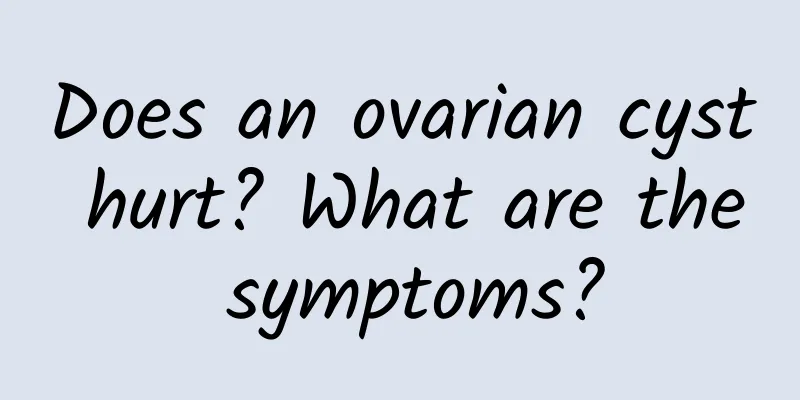Six major hazards of uterine fibroids that need attention

|
Although most uterine fibroids are benign tumors, if the treatment of uterine fibroids is neglected, it will cause the uterine fibroids to worsen, which is very harmful. What are the common hazards of uterine fibroids ? Here we will talk about the common hazards of uterine fibroids. In general, the common hazards of uterine fibroids are: 1. Free fibroids. Subserous uterine fibroids can twist at the pedicle, causing acute abdominal pain. In severe cases, if surgical treatment is not performed immediately, the pedicle may be broken and a free fibroid may be formed. Of course, the twisted fibroids can also drive the entire uterus, causing axial torsion of the uterus (mostly near the internal opening of the cervical canal). This is a common hazard of uterine fibroids. 2. Secondary anemia. Uterine fibroids can cause excessive menstrual bleeding. Over time, it can cause secondary anemia and even trigger anemic heart disease, which is also a common hazard of uterine fibroids. In severe cases, patients may experience general fatigue, pale complexion, palpitations, shortness of breath, and other adverse symptoms. 3. Malignant changes. Uterine fibroids are benign tumors, but a small number of women still cannot escape the risk of malignant changes (the rate of malignant changes is about 1%), which is particularly prominent in older women. It is a common type of harm caused by uterine fibroids. Therefore, those with rapidly growing fibroids or postmenopausal fibroids should be vigilant. 4. Infertility or miscarriage. This is also a common hazard of uterine fibroids. Uterine fibroids patients have fibroid tissue in the uterine corners compressing the entrance of the fallopian tube, causing the uterus to deform and hinder the implantation of the fertilized egg, ultimately leading to infertility. In addition, according to statistics, the spontaneous abortion rate of fibroid patients is also higher than that of ordinary people, with a ratio of 4:1. 5. Adhesion or inflammation. After the subserosal uterine fibroid pedicle is twisted, intestinal adhesion will occur, which will be infected by intestinal bacteria. The inflamed fibroid will adhere to the uterine appendages, causing suppurative inflammation. On the other hand, fibroids can also cause pathogenic bacteria to invade other uterine organs due to bleeding, causing gynecological inflammation such as adnexitis and pelvic inflammatory disease. 6. Infection and suppuration. Uterine fibroids can cause pelvic congestion and infection. The infection is mostly caused by the torsion of the tumor pedicle, while blood-borne infection is extremely rare. After infection, a few patients will form abscesses in the tumor tissue, while the rest will show suppuration. These are all hazards of uterine fibroids. The above is an introduction to the hazards of common uterine fibroids. I hope it will be helpful to everyone. Once you have uterine fibroids, you must go to the hospital for treatment in time to avoid missing the best time for treatment. |
<<: Introduction to six common symptoms of uterine fibroids
>>: Brief analysis of the main symptoms of malignant uterine fibroids
Recommend
You don't have to use soy sauce to enhance the flavor. Lemon juice can enhance the freshness.
[Key Points]: If you want to enhance the taste of...
What medicine can be used to regulate menstruation?
What medicine can be used to regulate menstruatio...
What are the factors that induce dysmenorrhea?
"What are the factors that induce dysmenorrh...
What are the symptoms of congenital absence of vagina?
Congenital absence of vagina, as the name suggest...
Can menopause be cured?
The pace of life of women nowadays is very differ...
Get rid of obesity and diabetes weight loss surgery to help
Losing weight can also get rid of the threat of d...
What are the dangers of bacterial vaginosis
Bacterial vaginosis is probably familiar to many ...
Chinese medicine wine is effective in treating dysmenorrhea
Traditional Chinese medicine often uses medicinal...
Why are women more susceptible to vaginitis after menopause?
Vaginitis is a common disease among women, and po...
Do this to lift your buttocks and squat to lift your buttocks
[Key Points]: Squats can be said to be the "...
How much does it cost to have a painless abortion?
Nowadays, people aged 18-25 are the most likely t...
Analysis of common precautions for acute cervicitis
The precautions for acute cervicitis are of great...
What is menopausal irregular menstruation? There are 3 common treatments for menopausal irregular menstruation.
1. Psychological adjustment Irregular menstruatio...
Causes of irregular menstruation
What are the causes of irregular menstruation? 1....
What are the methods to cure dysmenorrhea?
What are the methods to cure dysmenorrhea? Dysmen...









